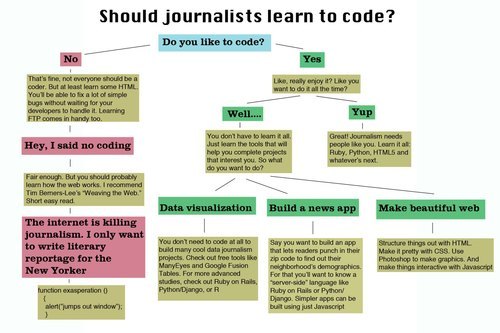Data, Journalists, and Learning to Code for the Newsroom
Recently the topic of coding for journalists has been a subject of debate, from The Atlantic’s “Should Journalism Schools Require Reporters to ‘Learn Code’? No” to Noah Veltman’s “On journalism and learning to code (again)“.
PandoDaily even crafted this handy flowchart for journalists:

(Source: Flowchart: Should journalists learn to code? PandoDaily)
Parse.ly’s core mission is making data consumable and actionable for news editors, so we understand this challenge. How can newsrooms use more data and coding to create better journalism?
Derek Willis, an interactive reporter for The New York Times wrote about the issue saying,
“News organizations are inefficient, often far too cavalier about the raw materials that provide their lifeblood and can seem to lurch from story to story without a whole lot of reason. Many journalists have a bizarre fear of math and computers, and guaranteed a secret ballot, a decent portion might opt for a return to the days of typewriters and afternoon editions.”
Having the skills to analyze and present information through code doesn’t subvert the traditional reporting system—it adds a richer layer to the level of reporting. This interactive breakdown of the elite attendees of Davos this year and this time-lapse map of the Citi Bike bike-share program in New York transform what would be unintelligible numbers into content that’s fit for consumption by the general public.
And so, web and print journalists (who did not land on “I only want to write literary reportage for the New Yorker,”) can benefit from learning to code, though the phrase itself has multiple meanings, from front end visualization to back end data scraping.
We’ve pulled together some digital media experts to share their experiences and insights on journo-developing. We spoke to David Yanofsky (Reporter at Quartz), Emily Chow (Graphics Editor of The Washington Post), and Zach Sims (CEO of Codecademy) about their experience as reporters and how journalists can learn to code in order to enhance their reporting.
Why did you start coding as a reporter?
EC: “I started learning the sophomore year of college. I had official exposure through nuAsian, this really amazing magazine that I worked for at Northwestern. Going into j-school and thinking about what I wanted to do when I was 18, I never thought of interactive graphics or interactive journalism. It was a niche that was worth pursuing, and it was kind of different from what I focused on in high school, which was photography and basic layout design. I don’t think I realized that anything else was being done. I managed to use my spare time to learn how to code.”
DY: “I got a BFA in Communication Design at Washington University in St. Louis, but I didn’t learn any coding there. With my design experience, I started with a project I wanted to achieve, and from there, I learned a lot of Javascript and HTML5 for data visualization. I was a multimedia designer at Bloomberg, where I taught myself to code, and from there, I moved onto Quartz.”
What is the biggest obstacle—mental, logistical, or otherwise—for journalists who want to start coding?
ZS: “[CodeAcademy thinks] getting started is often the most difficult part—overcoming the perception that programming is impossible is a great place to start. You don’t need a formal math or science background to be good at programming, but oftentimes you do need lots of persistence.”
DY: “I think the hardest part is knowing where to start. There’s a lot of obstacles involved; for example, you need to have a clear idea of what you’re doing and what you’re accomplishing. When you’re attempting a project, you need to know why and how everything works, instead of just coding in abstract theory.”
EC: “A lot of the journo-developers out there are actually self-taught. And I think, from what I gather, self-taught is just finding a project and then, just trying and failing a lot… until you really take a crack at it, you don’t really understand it.”
Do you think programming is a “new form of literacy” in the age of the web?
EC: “I think the term ‘data’ has become trendy in the way that I look at it. From my understanding, computation-powered reporting has existed before. There has always been data, after all. Now, the idea of interactive graphics—those are the things that have become especially interesting to readers.”
ZS: “Definitely. Programming is intimately involved in almost everything we do and it’s hard to go a day without touching a program someone else built. It makes intuitive sense to understand how to use those technologies.”
What resources do you recommend for journalists starting to learn to code?
ZS: Codecademy: “A decent number of our users do use Codecademy for pre-professional development. We’ve got a few success stories that highlight uses like this. Also, we work with a lot of institutions to help design programs for them.”
EC: Stack Overflow: “There are probably at least 1,000 other people out there that have probably come across the same problem you have, and a huge community of coders of all skill levels that offer solutions or a better understanding of why your code doesn’t work. It’s just helped lead me in the right direction or to the right documentation, many times.”
DY: Hackathons: “I didn’t learn to code in school; I studied design. I did a hackathon at the Columbia University Graduate School of Journalism, which was very helpful because it allowed me to focus on a project and objective.”
DY: ScraperWiki: “It’s an online tool that allows you to code from information that you run from somewhere on the internet.”
(Post was compiled with help from Noel Duan, Summer ’13 Business Intern.)